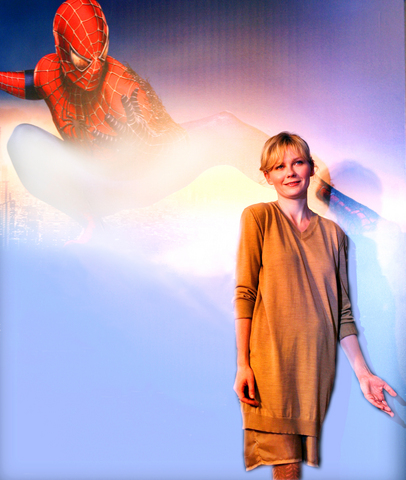With her drawn, solemn little mouth, perturbed eyes and often furrowed brow, Kirsten Dunst has often been characterized as the rather serious representative from the young acting crowd. Even as an 11-year-old in Interview With a Vampire, her memorable film debut, her impassive, pale face gave her a more cerebral appearance than any of the older and more experienced actors around her. (Admittedly not difficult when acting alongside Tom Cruise and Brad Pitt, but still not bad going for a prepubescent.)
When we meet in an airless hotel room in London, she raises a thin eyebrow at the perception of her as "the serious one," but adds that working in the acting business from such a young age has given her a harder core than most of her contemporaries. It has probably come from more than just working. Although her family life has been nowhere near as fraught as that of contemporaries like Lindsay Lohan, whose battles with her father have kept the American media enthralled for years, Dunst has endured her own issues. She financially supported her family as a teenager, something she began to resent: "Um ... now I'm proud that I have the means to help my family," she begins hesitantly, "but when you're younger you struggle with things. I mean, I struggled that I was famous at all. It's hard to grow up in this industry, and some people work out how to do it quicker than others. But yeah, it probably has made me a stronger person — I have a very good bullshitometer." Does she have to use that regularly? She makes a dry pause: "Only during press junkets."
This jumpy sense of antagonism is understandable in a young woman — Dunst isn't yet 25 — who has been poked and prodded by the media all her life. She has been asked her thoughts on everything from global warming to her favorite flavor of ice cream, but the constant interest in her love life has made Dunst buckle in every interview in which the subject is raised. She called a journalist a "bitch" when she wouldn't stop asking questions about Dunst's ex, Jake Gyllenhaal. In one of her first interviews, when she was promoting Interview With a Vampire aged just 12, a journalist from the LA Times solemnly asked her, "In a sense, this is a film about the dark side of romantic love; have you ever been in love?" (Dunst, to her great credit, politely replied: "I've had crushes but I'm not sure what you mean by 'in love.'")

PHOTO: AFP
Dunst's current relationship with singer Johnny Borrell from Razorlight has enthralled the press. She dismisses any questions with a pithy, "I don't gossip about myself," but can't resist mentioning how much she "admires" musicians these days.
Her film choices have suggested a similarly offbeat sensibility, more than one usually finds in an actor now on the receiving end of a very blockbuster-sized paycheck of US$10 million a movie. Films like Wag the Dog and The Virgin Suicides brought her indie credibility, while the enjoyable cheerleader satire Bring It On gave her wider comic appeal. Her resume is far from faultless, particularly recently, with disappointments such as Wimbledon and Elizabethtown. But, in the main, Dunst is one of the very few child actors to have made an irrefutably triumphant transition from child actor to grown-up star.
When we meet, it's apparent from the start how she has done this. Sitting in a ridiculously ornate plush armchair which dwarfs her, making her look even more frail in her skinny black trousers and T-shirt which flaps around her thin, pale arms, she looks utterly unflustered by the chaos around her, with various over-eager assistants dashing up and down barking excitedly into walkie-talkies about "how Kirsten's doin'." She laconically inhales on another cigarette ("It's bad for me, I know, but, like, I won't do it forever"), and looks detached from all the surrounding gilt.
Dunst is promoting Spider-Man 3, the latest installment to the US$2 billion franchise. In the fine tradition of all talented actors who take the big-studio shilling and star in a mainstream action movie, she insists that the Spider-Man films keep "the emotional core at the center" and that "it's always about the relationships between the people," a debatable claim for a film series that occasionally looks like it was designed more with merchandising spin-offs in mind than an "emotional core."
These have been her first big action movies and although she obediently sings the praises of the director, Sam Raimi, she doesn't sound totally enamored of the filming process, particularly the last three weeks which "were all about, you know, acting against the blue screen, which, for an actor, isn't the best." But she would, she says diligently, "definitely" consider doing a fourth Spider-Man, although she is currently ensconced in directing her first short film ("It's a little early to talk about it but, yeah, Sofia [Coppola] was definitely an inspiration"), and getting ready to star in a biopic of Debbie Harry.
Born and raised in New Jersey, Dunst has been performing since she was three, when her mother sensed she was "meant" to be an actress. Dunst today talks about how she's "in a really good place right now," the tightness of her mouth suggests past travails. She fell out badly with her mother as a teenager, primarily, it sounds, because of resentment at having been pushed into acting from such a young age. Even when she was 11 there were warning signs: she was so hysterical at the auditions for Interview With a Vampire that the director Neil Jordan asked her mother: "Is she right in the head?" "There was definitely a point in my life when I was like, whoa, I'm famous and it wasn't ... ." she pauses nervously, "Um, it wasn't my clear decision."
With this experience of growing up in an unsought spotlight, it's unsurprising that she felt such a personal connection to Marie Antoinette, who she played in Sofia Coppola's film last year. It's a point she readily concedes, pointing in particular to how they both "grew up in an environment where you had a lot of adults around you, who want something from you but don't necessarily have your best interests at heart." This might explain why Dunst appeared so hurt by negative reaction at its premier in Cannes, saying in one interview: "I was so angry about the way people were talking about it and fed up with this business. The movie was personal to me. It felt like everyone was stamping on me."
Dunst has often displayed such unexpected emotional openness in interviews. She insists that "I never regret anything I say" but her behavior today suggests otherwise. In an interview earlier this month she spoke at length on her liberal views on drugs: "I've tried drugs. I do like weed. I have a different outlook on marijuana than America does. My best friend Sasha's dad was Carl Sagan, the astronomer. He was the biggest pot smoker in the world and he was a genius. I've never been a major smoker, but I think America's view on weed is ridiculous ... . If everyone smoked weed, the world would be a better place."
Today, however, she shifts crossly in her seat when the subject is raised: "I'm not going to defend what I said and I don't want to talk about it any more." It must be hard, I suggest, to have lived your teenage rebellion in public, where journalists throw it back in your face forever. She looks a little surprised and her mouth tightens more: "I've never had a teenage rebellion, I'm not that type of person. I always work out my problems in a conscientious way."
The day after we meet, the papers are full of pictures from the Spider-Man 3 premiere. In particular, photos of Dunst and Borrell leaving a club at 4am, Dunst almost looking like she's starting to have some fun, her mouth a little less tight, her face a little less conscientious.

Sept. 1 to Sept. 7 In 1899, Kozaburo Hirai became the first documented Japanese to wed a Taiwanese under colonial rule. The soldier was partly motivated by the government’s policy of assimilating the Taiwanese population through intermarriage. While his friends and family disapproved and even mocked him, the marriage endured. By 1930, when his story appeared in Tales of Virtuous Deeds in Taiwan, Hirai had settled in his wife’s rural Changhua hometown, farming the land and integrating into local society. Similarly, Aiko Fujii, who married into the prominent Wufeng Lin Family (霧峰林家) in 1927, quickly learned Hoklo (commonly known as Taiwanese) and

The low voter turnout for the referendum on Aug. 23 shows that many Taiwanese are apathetic about nuclear energy, but there are long-term energy stakes involved that the public needs to grasp Taiwan faces an energy trilemma: soaring AI-driven demand, pressure to cut carbon and reliance on fragile fuel imports. But the nuclear referendum on Aug. 23 showed how little this registered with voters, many of whom neither see the long game nor grasp the stakes. Volunteer referendum worker Vivian Chen (陳薇安) put it bluntly: “I’ve seen many people asking what they’re voting for when they arrive to vote. They cast their vote without even doing any research.” Imagine Taiwanese voters invited to a poker table. The bet looked simple — yes or no — yet most never showed. More than two-thirds of those

In the run-up to the referendum on re-opening Pingtung County’s Ma-anshan Nuclear Power Plant last month, the media inundated us with explainers. A favorite factoid of the international media, endlessly recycled, was that Taiwan has no energy reserves for a blockade, thus necessitating re-opening the nuclear plants. As presented by the Chinese-language CommonWealth Magazine, it runs: “According to the US Department of Commerce International Trade Administration, 97.73 percent of Taiwan’s energy is imported, and estimates are that Taiwan has only 11 days of reserves available in the event of a blockade.” This factoid is not an outright lie — that

The People’s Republic of China (PRC) yesterday paraded its military hardware in an effort to impress its own population, intimidate its enemies and rewrite history. As always, this was paced by a blizzard of articles and commentaries in the media, a reminder that Beijing’s lies must be accompanied by a bodyguard of lies. A typical example is this piece by Zheng Wang (汪錚) of Seton Hall in the Diplomat. “In Taiwan, 2025 also marks 80 years since the island’s return to China at the end of the war — a historical milestone largely omitted in official commemorations.” The reason for its